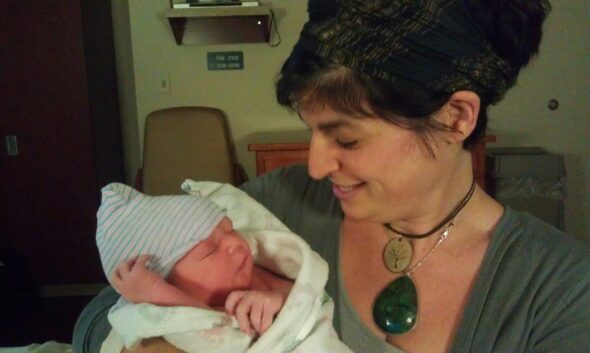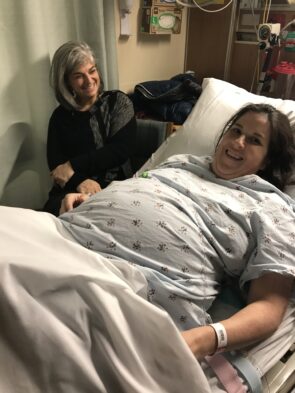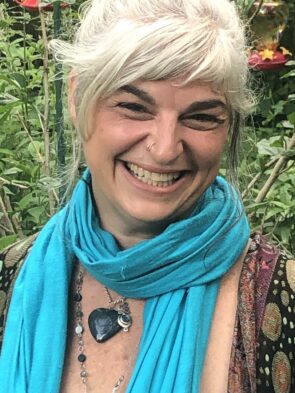
Amy Rebekah Chavez has been a practicing doula for 23 years and has been present at the births of an estimated 900 babies during her career. (Submitted photo)
The birth of a doula movement
- Published: January 12, 2022
“Giving birth” is often used as a metaphor — the birthing of new ideas, celebrating new beginnings such as the new year, a new job, or personal transformation journey. But there are those among us who have a direct, intimate, perhaps even sublime understanding of the process of bringing forth life, assisting mothers as they give birth. This is the role of a doula.
Villager Amy Rebekah Chavez, a doula for 23 years, has this understanding, holding it in sacred trust, ensuring the safety of both mother and child in the birth process. Chavez estimates that she’s supported the labors of around 900 women during her career as a doula, many of them in Yellow Springs.
“I would have an experience of being at the Mills Lawn playground and seeing two children playing, and I know that they were both born in the same bed, or the same birth pool, but they don’t know that. It’s this strange story that I carry around,” Chavez said.
Chavez and her partner Brady Burkett have lived in the village since 2006. Chavez is the mother of two daughters, Modjeska, age 25, and Lorien, age 22. Born just outside of Lima, Ohio, she moved with her family to Centerville when she was nine years old and is a graduate of Centerville high school. A burgeoning naturalist as a teenager, Chavez discovered Yellow Springs like many people do — through nature.
“Growing up in this area, my favorite thing to do was to go find woods to go hiking. That’s what my friends and I liked to do, so when I was 15, when somebody got a driver’s license, we found our way to Yellow Springs,” Chavez said.
Background and becoming a doula
Chavez found her way into her career through the world of childbirth. In 1997, while attending school at Evergreen College in Olympia, Wash., Chavez became a mother at the age of 21. She considers herself fortunate to have been living in one of the only states where home birth and midwifery were legal at the time.
“Not only was it legalized but [midwifery and home birth] were part of the system. I was a young woman and a college student; I didn’t have money. I was afforded an incredible home birth midwife, who had an assistant. I had my prenatal appointments in a cottage behind her house, and she educated me about my body and pregnancy and marriage,” Chavez said.
Needing to grow up quickly, Chavez was grateful for the care and education provided to her by the midwife.
“She walked with me through the entire process,” she said.
However, when a doula named Rachel became part of the birthing process at the last minute, Chavez’s experience deepened. A doula is trained to provide physical, emotional and educational support to women at all phases of pregnancy, including some postpartum care.
“Even though we had no history together, like I really didn’t know her, there was something about the role that she stood in through the labor process,” she said.
Chavez said that even though she did have the loving support of her mother and partner at the time, there was something about having the support of a doula that was different. According to Chavez, the focus was on her.
“This woman, who’s not focused on the fetal heart tones, on taking care of the baby, who was not nervous like my mother — yeah, it’s so true that there’s nothing that can slow a labor down like a mother or mother-in-law — this woman just embodied a trust in the process,” she said.
Her doula became a touchpoint for Chavez while she was giving birth to her oldest daughter.
“I would look at her and be very sure that I was close to death, and the depth of her gaze, her never leaving, her staying with me energetically through the whole process was what kept me,” Chavez said.
Giving birth through that process was such a transformative experience that Chavez enrolled at the Seattle Midwifery School six months after giving birth.
“I’d just had this gloriously empowering, beautiful home water birth in my living room, and it was the beginning of a healing relationship with my body, it was the beginning of a commitment to really be on the planet for the first time,” she said.
Chavez said she came back to Ohio a couple of years following midwifery school, after ending an abusive marriage — a situation about which she’s very open.
“That’s a part of who I am, that’s my story,” she said. “I found myself inside of a marriage that was not conducive for children or staying safe, so when my oldest was two-and-a-half-years old and my youngest was two and a half months old, I needed to pick up and leave. I just found myself coming home to my parents, which was kind of surprising to me — I really thought it would be just for a minute, and that was New Year’s of 1999.”
After the move, Chavez enrolled at Antioch McGregor, now Midwest, in the adult bachelor’s degree program.
“That’s where I met Brady,” Chavez said, her face lighting up with a wide smile upon mentioning her partner of 17 years.
Doula/midwife history

Amy Rebekah Chavez, shown above with very expectant mother Katie Warber, has been a practicing doula for 23 years and has been present at the births of an estimated 900 babies during her career. (Submitted photo)
What is the difference between a doula and a midwife? The answer requires some charting of history — from the mid-20th century to current times. The conversation also involves the hard realities of medical protocol that replaced traditional birthing practices facilitated by women for centuries.
“If you imagine the archetypal idea of what a midwife used to be, it was somebody in the community who not only knew the clinical care of how to support a woman through pregnancy, labor, birth, postpartum and emergency care that might arise — things like that — but she knew the family, she knew your grandmother, she probably knew how your sisters gave birth. She knew if you got beat up, she knew if your dad was a jerk, she knew your stories,” Chavez said.
While midwifery practices are part of an ancient tradition, their influence waned as clinic-oriented modern medicine birthing practices — particularly as they pertain to Western society — overtook more traditional approaches. Traditions around women’s childbirth, and who is part of that process, devolved into laws outright banning certain practices. Educational requirements and licensure largely limited or eliminated the role of midwives and doulas in the medical birthing experiences of women in the U.S. around the 1940s.
“In the era around World War II, the birth culture went towards the hospitals — that’s when the medical model and hospitals really took over more of birth care,” Chavez said.“There was a lot of arresting of midwives, a lot of legality that started to happen, and power structures that persecuted midwives.”
Chavez said midwives lost the capacity to educate and support the initiation into motherhood — an initiation from one stage of life to another. These changes also resulted in harmful labor practices.
“When my grandparents were giving birth, they were using a drug that would knock women out. It was a Nazi drug used in the holocaust called scopolamine, a drug used in labor,” she said.
Scopolamine was used in conjunction with morphine to put women into “twilight sleep,” which rid them of the pain of childbirth, but also the memory of the process. Having no awareness of having given birth, women would regain consciousness, and be handed their child without real biological attachment to what had occurred physically during the birthing process.
Nazi Josef Mengele experimented with administering scopolamine as a truth serum drug for interrogations. It has also been used more recently as a “date rape” drug.
“So, to come back to the question of the differences. In the ’60s, a next generational wave, it kind of went with the ‘back to the land’ movement, where there was more of a resurgence of midwifery, as a way of people wanting to take back their power and just let birth be a normal experience and not a highly medical interventive traumatic experience,” said Chavez.
She also said that when midwifery re-emerged in the ’60s, practitioners had to adapt to the standards of the medical profession, which was constantly under the pressure of a corporate medical structure. This supplanted some of the emotional and spiritual support that midwives and midwife nurses could give to women.
“You know, a nurse midwife may have seven babies in one night. You can’t [provide] that one-on-one care with that quantity. The role of the doula kind of emerged from people noticing that support matters, that women in isolation had worse birth outcomes than women who had support,” Chavez said.
Evolving practices
Chavez is a trained herbalist, and often integrates her knowledge of plant medicine with doula, birth education and greater community engagement.
“I was actually studying organic gardening and herbal medicine at Evergreen College when I got pregnant. My introduction into motherhood was very coupled with, ‘How do I take care of myself and my baby in natural ways?’” she said. According to Chavez, she is in conversation with Agraria to provide some herbal education programs that will weave healing practices for the land, plants, and humans together.
Chavez explained that a lot of women who enter doula work are mothers, and do so because of previous traumatic experiences with their own birthing process and have a desire to help others overcome trauma and gain self-empowerment through a positive birthing experience.
To build financial and intellectual resources, Chavez has continued over the years to educate herself, explaining that the “one thing that this society offers is the option to go into debt and receive short term loans so that you can invest in yourself.”
She leverages her student loans to pay for education that is not accessible through traditional education, programs such as craniosacral therapy and somatic trauma resolution and somatic experience, often considered more of a holistic alternative.
“They’re very expensive and very exclusive, which is part of why I feel like my story as a single mother matters. Things weren’t certified and separated and capitalized upon, and that is what has happened. Part of healing is bringing people together. It should not be so separated and exclusive and high access because that’s not good for anybody,” Chavez said.
Chavez is not immune to the changing economic climate and affordability issues in Yellow Springs. She saw clients for eight years in a small home she rented, called Bhakti House. It was purchased by a new owner and turned into an Airbnb four years ago, and she was forced to shutter her practice for a while. Not sure what her next steps would be with her doula work, Chavez pivoted into a Ph.D. program, and currently attends Antioch University, where she is enrolled in the doctoral leadership program.

Amy Rebekah Chavez (Submitted photo)
“I am researching the intersections between trauma-informed care, and embodied, responsible leadership,” she said.
Chavez’s doula work has also taken her in the direction of teaching. This winter, she will begin a training program for professionals called Healer H.E.A.L. (holistic embodied leadership) Thyself.
“The program is geared towards professionals in the perinatal field as well as some educators, social workers, mental health therapists and bodyworkers who also work in support of pregnant and parenting people,” Chavez wrote in a text.
Doula work involves long hours, with practitioners sometimes traveling long distances in bad weather. Doulas work in homes or in hospitals. Schedule flexibility is key, as babies come when they are ready. This can be disruptive for their own families. Unfortunately, doulas, like many critical-to-society workers, primarily women, often receive poor pay.
Chavez, who is Jewish, has served women of diverse ethnicities and incomes. At one time, Chavez traveled just over the Ohio border into Indiana to assist women in an Amish community to give birth, which broadened her perspective on how normalized the process was in other cultures.
“Exploring birth from a different culture, everything was much more normalized, [birth] wasn’t as problematized. It really opened my eyes to the impact of culture around safety and the stories we tell ourselves about birth and how it impacts us as mothers,” she said.
Chavez explained that women often seek out the services of a doula at all stages of pregnancy.
“It depends on the person. Some people will call when they’re thinking about getting pregnant, some people will call after they peed on a stick and they’re pregnant, and then other people are like, ‘I’m 37 weeks and I just learned about what a doula is,’” she said.
Chavez said the ongoing COVID pandemic has made giving birth much more complex, limiting the number of people who are allowed into the hospital.
“Parents lost a lot of choices that were deeply impacting their sense of safety such as, if the mother tests positive, the baby will be separated, nobody allowed in and being masked and isolated. You know, some really hard things,” Chavez said.
Chavez is currently working collectively with a group of doulas in the Miami Valley region in a training and mentorship capacity. Many are Black, recent entries into the field with a specific desire to reduce the disturbingly high mortality rate for Black infants and mothers in Montgomery County. At the end of 2019, the group formed a doula cooperative with the assistance of Co-op Dayton, called Trauma and Resiliency Informed Birth Education, or T.R.I.B.E.
Chavez told the News the collective is “an intersectional and interdisciplinary network of perinatal and parenting support professionals working together to change the culture of pregnancy, birth and parenting in our communities with a focus on trauma-informed education, support for parents, and education and professional development and peer support.”
According to Chavez, there is research to support the need for more support for women during labor, even from unfamiliar nurses.
“It’s kind of like my [birth] experience where I didn’t really have a history with this woman [Chavez’s doula, Rachel]. I was drawing from the connection, the presence of another woman, that actually had an impact, and was affecting a birth outcome,” she said.
The Yellow Springs News encourages respectful discussion of this article.
You must login to post a comment.
Don't have a login? Register for a free YSNews.com account.











No comments yet for this article.